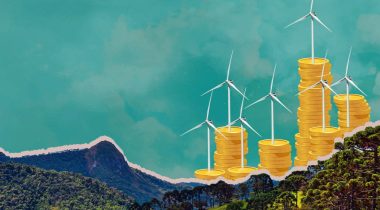

Franziska Mager, Andres Knobel ■ Beneficial ownership and fossil fuels: lifting the lid on who benefits

Until now, the tax justice and climate justice movements have mostly tended to operate in isolation from each other, despite having many common goals and objectives. This is the first in a series of blogs examining underexplored issues at the intersection of tax justice and climate justice. At the heart sits seeking to redress historic and ongoing inequalities in the exploitation of planetary carbon boundaries, and in the unfair distribution of ongoing human costs. Carbon tax justice uses progressive policies to uncover and reduce inequalities, significantly reduce emissions and facilitate a just transition.
In this blog we explore how climate justice and tax justice advocates can unite and demand beneficial ownership transparency for carbon-intensive industries, especially for listed companies and investment funds.
Who are the beneficial owners of the climate crisis?
Beneficial ownership transparency means identifying those individuals who ultimately own, control or benefit from legal vehicles such as companies, trusts or foundations. It is a transparency tool generally associated with tackling money laundering, tax evasion, corruption and the financing of terrorism. But there’s more to it.
Until now, it has been almost impossible to know who the beneficial owners of the most carbon-intensive companies are. A litany of loopholes prevent identifying real owners: from high thresholds in the beneficial ownership definition (allowing anyone with less than 25 percent of shares in a company to avoid scrutiny) to directly exempting investment funds or listed companies. For instance, the Extractive Industry Transparency Initiative (EITI) standard requires disclosure of only the name of the relevant stock exchange and not the name of the end-investors of the listed company.
Trying to lift the lid on beneficial ownership and fossil fuels, Dario Kenner’s Polluter Elite Database tried to manually identify the individuals and investors behind some of the largest oil companies. For Exxon Mobil, for instance, (and using publicly available data from 2015) he could only account for 12.08 per cent of the shares, most of which belonged to two large investment funds: BlackRock and Vanguard. In other words, we have no way of knowing who the individuals are who ultimately hold the remaining 88 percent shares, nor who is indirectly benefitting via BlackRock and Vanguard.
Beneficial ownership transparency has huge potential to help address the extreme inequality in global carbon emissions. It could strip away the existing layer of anonymity protecting those owning carbon intensive investments, and level the playing field for effective, fair policies to reduce greenhouse gas emissions.
A global asset registry for big polluters
The real purpose of beneficial ownership transparency of companies and other legal vehicles (as currently implemented in many countries) should be to ultimately know who the real owners of high value assets are, like real estate, yachts, private jets, collectible art, precious metals, etc. Countries could start by joining up their beneficial ownership registries for companies and trusts with national asset registries for particularly high value assets, that would ultimately converge in a global asset registry. This could serve as the foundation for various global ‘good taxes’, would also help with asset recovery in criminal cases with unexplained wealth orders, and improve the measurement of wealth inequality.
But there is also a crucial climate argument for a global asset registry. Dario’s work proves that most luxury assets like yachts and private jets are highly polluting.
Other studies show how, for example, soy and beef farming have been associated with deforestation in the Amazon – while more than two thirds of their foreign capital has been channelled through tax havens. Moreover, about 70 per cent of vessels implicated in illegal, unreported or unregulated fishing were registered in tax havens, using flags of convenience to disguise their activities and make them harder to track.
Lifting the lid of anonymity that conceals the real owners of these assets is a key step in making polluters pay, be it through climate damages taxes or other policy interventions aimed at reducing greenhouse gases.
A lot has to happen to implement a global asset registry. Both beneficial ownership and asset secrecy loopholes need to be fixed.
In line with the recommendations from our ‘Roadmap to effective beneficial ownership transparency’, climate justice and tax justice advocates should call on policymakers in every country to establish laws (or amend existing frameworks) to make sure that:
- All legal vehicles (companies, trusts, foundations), especially those involved in greenhouse gas-intensive industries, are subject to beneficial ownership transparency, by registering their beneficial owners in central registries that are publicly accessible.
- Investment funds and companies listed on the stock exchange should be subject to comprehensive beneficial ownership transparency, with as broad a definition as possible, covering any individual with at least one share, vote or rights to benefits or dividends – or any other means of control.
- Beneficial ownership registries should be connected to asset ownership registries to determine the beneficial owners of high carbon assets such as large-scale commercial farmland, cars, yachts, private jets, etc.
- Big polluters who amass obscene levels of wealth from harmful industries should be subject to wealth taxes, progressive taxes or other measures to reduce climate inequality.
Conclusion
Carbon-intensive companies and sectors dramatically worsen the climate crisis. However, there is very little information about individuals (the “beneficial owners”) ultimately owning, controlling or benefiting from these companies. The complex ways in which individuals can hold opaque interests in carbon-intensive industries is indistinguishable from those used by criminals to engage in money laundering and tax evasion.
The climate crisis and illicit financial flows related to money laundering, tax evasion or corruption are closely connected. There is one policy measure that could help tackle both: beneficial ownership transparency and, eventually, a global asset registry.
Achieving carbon justice is possible. We can start by uncovering those profiting most from the climate crisis, and introducing wealth and other progressive taxes.
Related articles

The tax justice stories that defined 2025

2025: The year tax justice became part of the world’s problem-solving infrastructure

Two negotiations, one crisis: COP30 and the UN tax convention must finally speak to each other

Taxation as Climate Reparations: Who Should Pay for the Crisis?

Why Climate Justice Needs Tax Sovereignty

Why are we gathering in Brazil to talk climate? Why now?
One-page policy briefs: ABC policy reforms and human rights in the UN tax convention

Reclaiming tax sovereignty to transform global climate finance
Reclaiming tax sovereignty to transform global climate finance
16 June 2025


